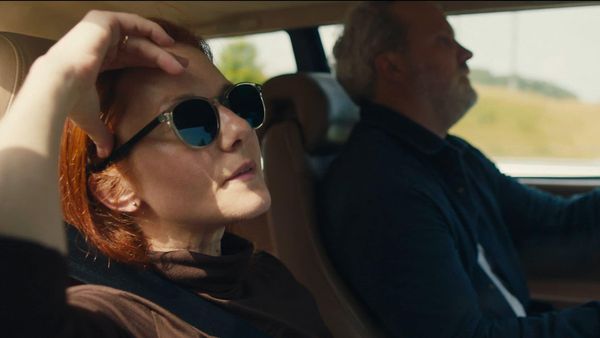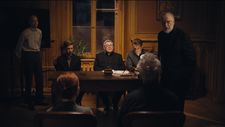 |
| Titas Laucius: 'My closest friends say that I'm 70 years old, in my head, in my soul. I really like the feeling of nostalgia and I wanted to get this feeling' Photo: Courtesy of POFF |
How did you decide to marry the parade idea with the Catholic/divorce theme?
 |
| Titas Laucius: 'I really like Czech humour and Czech New Wave movies. They have a dark melancholic humour' Photo: Courtesy of POFF |
It’s quite a big cast for a first film, because you have all the younger people in the orchestra along with the older cast. How tricky was that process?
TL: I did a graduation short film, and most of the older generation people were in it. So the worst thing was then, when I was a student. I really enjoy ensemble films, like Altman movies, and I like creating characters. I saw straightaway it was a good idea. I also knew I didn't want to make fun of religion. So that was the reason I created more than two or three priest characters so that it wouldn’t feel like a caricature. I think the uniform in the movies is funny straightaway, and it can get into stereotypes. You know, police uniforms, fire uniforms and priests.
It was a bit of a struggle because it’s kind of funny what they're saying, but I didn't want to make fun of them. So there is one angry priest and a worldly priest who says, “I get you, I get you, I know how you feel”, and these different characters. The idea came from this problem.
Were there any particular challenges in moving from short films to features?
TL: Absolutely. I was directing short films, but I was writing feature films for other directors, but when you're doing it for yourself, it's kind of different. You’re worried because the theme is good, but you think, “I'm too young to do that. It's gonna be stupid and primitive” and stuff like that. You’re also afraid about the rhythm.
Given that you’re writing projects for other people at the same time, how do you select the one you’re going to keep for yourself?
 |
| Parade Photo: Courtesy of POFF |
Do you think you might be drawn to direct comedy more than other genres?
TL: When you start writing and you say, “It’s going to be a serious movie” it’s just impossible for me. Maybe it’s how I see life. I think it came from my parents, my dad especially. I see the absurd. Yesterday for example, our friends came to see the movie and they were super-early before the premiere. They walked by the photoshoot and the people from the festival, they thought that they were the team from Parade, and they played the “Dear guests” recording.
Can you tell me a bit about the song that you use in the bar when Migle’s family and her ex and his fiancee get together, which Migle and her elder daughter from her first marriage remembers from her childhood. Was that very popular in Lithuania?
TL: It is a very popular artist, something like Leonard Cohen in Lithuania. It's kind of popular, but not everyone likes it. One of the decisions was that we wouldn’t translate it, because it is about cherries that grow in a particular region of Lithuania. But if you're watching and you would read the lyrics, it would ruin the song. The daughter explains it to her boyfriend, who is a foreigner, and that’s enough. For me, it's kind of nostalgic from the Nineties.
You’re not a particularly old person but the film has quite a lot of nostalgia in it, including nostalgia for the remembered marriage. Is that an idea that interests you?
The younger daughter is so well cast because she is so deadpan in the movie. How hard was it to cast the role?
TL: She was acting in my previous movies as the main roles. So for her, it was a huge lesson, we had the conversation, but, you know, like, at first, she was kind of confused. Like, what should you do? You know, because you're not the main character. Then she realised that she had to support the main character. I wanted to create the relationship with the mother and youngest daughter because they have this conflict but they are similar. I wanted to make it like that their movements are kind of similar and when they are fighting, it’s like in western, these glances. When your son or daughter is very similar to you it's always complex, because you see yourself in them.
Who would you say you are influenced by in terms of writing comedy?
TL: I think when I was writing, it’s the Coen Brothers. They are my favourite. Also by Czech filmmaker Milos Foreman’s early films, because I really like Czech humour and Czech New Wave movies. They have a dark melancholic humour. I also love British humour, it is amazing but it's dark and very cynical. Czech humor is super dark, but there is hope in the end. I was inspired by that, because at that time, I was living in Prague, drinking beer and writing in the library, which was perfect.
Do you think travelling helps to keep your writing fresh?
TL: Yes, because I'm always like taking situations from my life and trying to reinvent them. I spent last month in Thailand and I went alone. You’re working all the time, just watching people. I also really like Herzog films, which have a perspective that he sees the thing, and he's making a point, which is kind of a very edgy thing, like his documentary voiceover. He's a character in his own films, which is against the rules. You have to ask why it's funny. For example, it's like, if you're stumble into a glass window, it's funny, but it doesn't add anything. I like it to find the meaning in the humor.
Tell me a bit about Pensive.
TL: It begins like a classic horror story about a class, who finish school and they are organising a party and they go to this kind of strange cottage. There are a lot of youth problems, we were just making fun of. In my school, there was a very famous basketball player, and now he's super famous. I really didn't like him because at that time he was mean to me. I was smaller, and he was like a basketball player. So I got revenge on him in this movie.






















